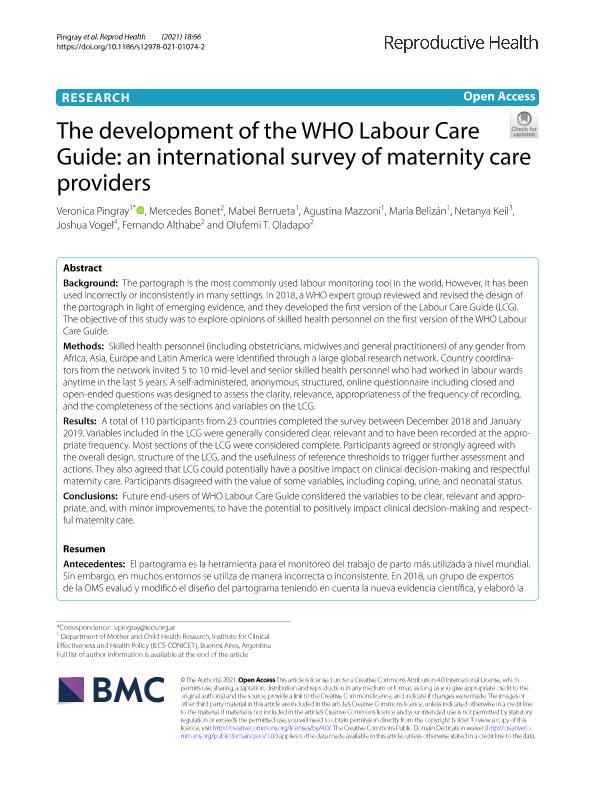Mostrar el registro sencillo del ítem
dc.contributor.author
Pingray, María Verónica

dc.contributor.author
Bonetto, Mercedes

dc.contributor.author
Berrueta, Amanda Mabel

dc.contributor.author
Mazzoni, Agustina

dc.contributor.author
Belizán, María
dc.contributor.author
Keil, Netanya
dc.contributor.author
Vogel, Joshua
dc.contributor.author
Althabe, Fernando

dc.contributor.author
Oladapo, Olufemi T.
dc.date.available
2022-10-31T10:47:12Z
dc.date.issued
2021-12
dc.identifier.citation
Pingray, María Verónica; Bonetto, Mercedes; Berrueta, Amanda Mabel; Mazzoni, Agustina; Belizán, María; et al.; The development of the WHO Labour Care Guide: an international survey of maternity care providers; BioMed Central; Reproductive Health; 18; 1; 12-2021; 1-9
dc.identifier.issn
1742-4755
dc.identifier.uri
http://hdl.handle.net/11336/175521
dc.description.abstract
Background: The partograph is the most commonly used labour monitoring tool in the world. However, it has been used incorrectly or inconsistently in many settings. In 2018, a WHO expert group reviewed and revised the design of the partograph in light of emerging evidence, and they developed the first version of the Labour Care Guide (LCG). The objective of this study was to explore opinions of skilled health personnel on the first version of the WHO Labour Care Guide. Methods: Skilled health personnel (including obstetricians, midwives and general practitioners) of any gender from Africa, Asia, Europe and Latin America were identified through a large global research network. Country coordinators from the network invited 5 to 10 mid-level and senior skilled health personnel who had worked in labour wards anytime in the last 5 years. A self-administered, anonymous, structured, online questionnaire including closed and open-ended questions was designed to assess the clarity, relevance, appropriateness of the frequency of recording, and the completeness of the sections and variables on the LCG. Results: A total of 110 participants from 23 countries completed the survey between December 2018 and January 2019. Variables included in the LCG were generally considered clear, relevant and to have been recorded at the appropriate frequency. Most sections of the LCG were considered complete. Participants agreed or strongly agreed with the overall design, structure of the LCG, and the usefulness of reference thresholds to trigger further assessment and actions. They also agreed that LCG could potentially have a positive impact on clinical decision-making and respectful maternity care. Participants disagreed with the value of some variables, including coping, urine, and neonatal status. Conclusions: Future end-users of WHO Labour Care Guide considered the variables to be clear, relevant and appropriate, and, with minor improvements, to have the potential to positively impact clinical decision-making and respectful maternity care.
dc.format
application/pdf
dc.language.iso
eng
dc.publisher
BioMed Central

dc.rights
info:eu-repo/semantics/openAccess
dc.rights.uri
https://creativecommons.org/licenses/by/2.5/ar/
dc.subject
CHILDBIRTH
dc.subject
INTRAPARTUM CARE
dc.subject
LABOUR
dc.subject
PARTOGRAPH
dc.subject
WHO LABOUR CARE GUIDE
dc.subject.classification
Otras Ciencias de la Salud

dc.subject.classification
Ciencias de la Salud

dc.subject.classification
CIENCIAS MÉDICAS Y DE LA SALUD

dc.title
The development of the WHO Labour Care Guide: an international survey of maternity care providers
dc.type
info:eu-repo/semantics/article
dc.type
info:ar-repo/semantics/artículo
dc.type
info:eu-repo/semantics/publishedVersion
dc.date.updated
2022-09-29T13:47:59Z
dc.journal.volume
18
dc.journal.number
1
dc.journal.pagination
1-9
dc.journal.pais
Reino Unido

dc.description.fil
Fil: Pingray, María Verónica. Instituto de Efectividad Clínica y Sanitaria; Argentina
dc.description.fil
Fil: Bonetto, Mercedes. Organizacion Mundial de la Salud; Argentina
dc.description.fil
Fil: Berrueta, Amanda Mabel. Instituto de Efectividad Clínica y Sanitaria; Argentina
dc.description.fil
Fil: Mazzoni, Agustina. Instituto de Efectividad Clínica y Sanitaria; Argentina
dc.description.fil
Fil: Belizán, María. Instituto de Efectividad Clínica y Sanitaria; Argentina
dc.description.fil
Fil: Keil, Netanya. Nyu Abu Dhabi; Emiratos Arabes Unidos
dc.description.fil
Fil: Vogel, Joshua. Burnet Institute; Australia
dc.description.fil
Fil: Althabe, Fernando. Organizacion Mundial de la Salud; Argentina. Consejo Nacional de Investigaciones Científicas y Técnicas. Oficina de Coordinación Administrativa Parque Centenario. Centro de Investigaciones en Epidemiología y Salud Pública. Instituto de Efectividad Clínica y Sanitaria. Centro de Investigaciones en Epidemiología y Salud Pública; Argentina
dc.description.fil
Fil: Oladapo, Olufemi T.. Organizacion Mundial de la Salud; Argentina
dc.journal.title
Reproductive Health
dc.relation.alternativeid
info:eu-repo/semantics/altIdentifier/doi/http://dx.doi.org/10.1186/s12978-021-01074-2
Archivos asociados
